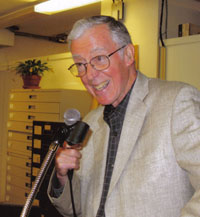Coffee Enemas, Aromatherapy, and Intercessory Prayer: Your Tax Dollars At Work

Why is the federal government spending millions on research into coffee enemas, aromatherapy, and intercessory prayer? Hint: It’s not our exit strategy from Afghanistan.
Trine Tsouderos of the Chicago Tribune has a scathing report on The National Center for Complementary and Alternative Medicine (NCCAM), an ideologically motivated side project within the National Institutes of Health which has received over $1.4 billion in grants to study scientifically dubious alternative remedies:
Thanks to a $374,000 taxpayer-funded grant, we now know that inhaling lemon and lavender scents doesn’t do a lot for our ability to heal a wound. With $666,000 in federal research money, scientists examined whether distant prayer could heal AIDS. It could not.
The National Center for Complementary and Alternative Medicine also helped pay scientists to study whether squirting brewed coffee into someone’s intestines can help treat pancreatic cancer (a $406,000 grant) and whether massage makes people with advanced cancer feel better ($1.25 million). The coffee enemas did not help. The massage did.
NCCAM also has invested in studies of various forms of energy healing, including one based on the ideas of a self-described “healer, clairvoyant and medicine woman” who says her children inspired her to learn to read auras. The cost for that was $104,000.
The Tribune reviewed 12 years’ worth of NCCAM documents to write this story.
Tsouderos succinctly explains why the public should be outraged. NCCAM is wasting money investigating hypotheses that have little or no prior probability of being true–some of them claim mechanisms of action that are medically impossible. In real science, extreme longshot research proposals are less likely to get funded than proposals with a serious chance of getting results. Most of NCCAM research proposals couldn’t compete with real medical research for regular NIH funding. At the same time, competition for medical research dollars is fierce, and the NIH’s overall budget is projected to plateau and eventually shrink.
As regular readers may know, I’ve been active in the skeptics movement for many years. Tsouderos interviewed my old Skeptics Toolbox colleague and friend Dr. Wallace Sampson, who was characteristically acerbic in his assessment of NCCAM’s research portfolio:
“Some of these treatments were just distinctly made up out of people’s imaginations,” said Dr. Wallace Sampson, clinical professor emeritus of medicine at Stanford University. “We don’t take public money and invest it in projects that are just made up out of people’s imaginations.”
As Tsouderos notes, complementary and alternative therapies are a $34 billion industry and 40% of U.S. adults report using some kind of alternative remedy in the last year. Wouldn’t it make sense to study these remedies, given that they’re being used so widely? For all we know, some of them are dangerous. Besides, even debunking useless claims would be a service to consumers. The problem is that NCCAM exists to validate alternative medicine, not to assess it critically.
NCCAM is a political oasis for research that could not compete in mainstream science. Sen. Tom Harkin (D-IA), one of the fathers of NCCAM, gave the game away when he lamented during a 2009 senate hearing that the center was disproving too many alternative therapies. “One of the purposes of this center was to investigate and validate alternative approaches. Quite frankly, I must say publicly that it has fallen short,” Harkin said. If Harkin were interested in applying science to CAM, as opposed to confirming his bias towards complementary remedies, he would be happy that useless treatments were found to be useless.
[Photo credit: opacity, Creative Commons.]









